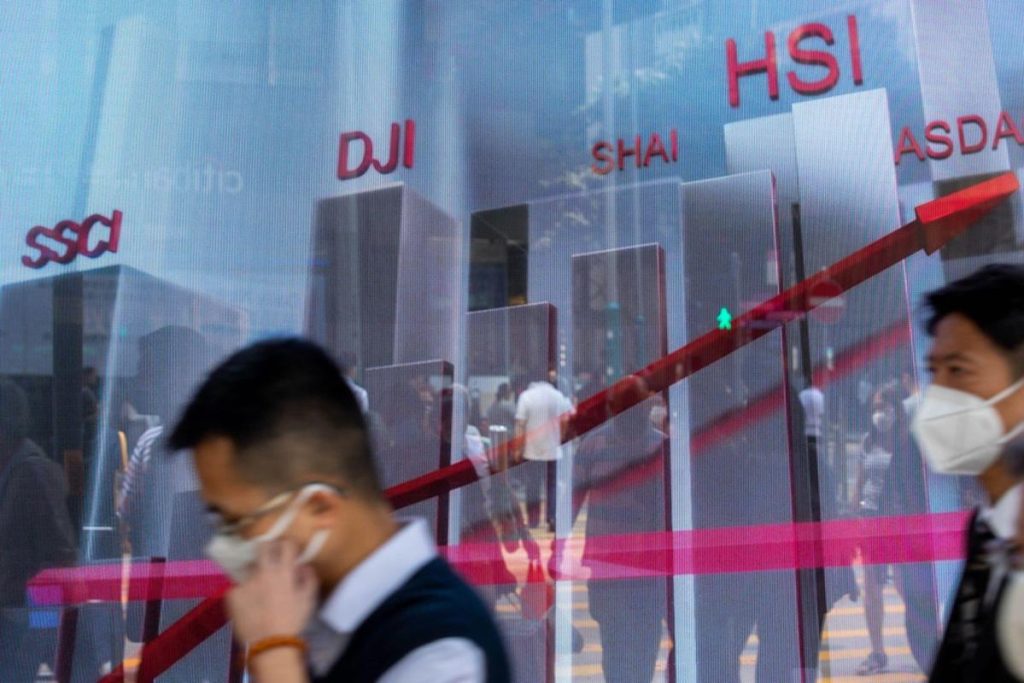(Bloomberg) — China has made a major push to stabilize troubled financial markets, promising to ease regulatory crackdowns, support real estate and technology companies and stimulate the economy.
Most Read From Bloomberg
The government should “actively implement policies that benefit markets,” according to a meeting of China’s top fiscal policy committee led by Vice Premier Liu He, the country’s top economic official. The pledge to take the interests of investors into account comes after the sale of local shares due to concerns about growth risks and strict regulations for real estate companies and the Internet.
The meeting provided investors with reassurance that the sweeping crackdown on Internet companies is coming to an end and that the government will prevent an uncontrolled collapse in the real estate market. China’s banking watchdog said after the meeting that it would support insurance companies to invest more in stock markets.
Stocks jumped after the announcements. The Hang Seng China Enterprises index jumped 13% at the close in Hong Kong, the most since 2008, recouping nearly half of this year’s losses. The CSI 300 index of mainland stocks rose 4.3%.
“The statement addressed many issues on different fronts, which is really rare,” said Ding Shuang, chief economist for Greater China and North Asia at Standard Chartered plc. “Selling tends to be self-fulfilling in part because of the government’s lack of response,” he said, and one of the government’s goals is likely to break this deadlock and stabilize market expectations.
The statement marks an adjustment after months in which China’s capital markets have been battered by government policies that range from squeezing funding for real estate developers to a sweeping regulatory campaign targeting internet giants such as Alibaba Group Holding and Tencent Holdings. The sell-off has deepened in recent days, as soaring energy prices caused by Russia’s invasion of Ukraine and an increase in Chinese coronavirus cases have called into question Beijing’s ability to meet its economic growth target.
The Financial Stability and Development Committee meeting concluded that there was a need to “boost the economy” in the first quarter and promised investors relief on several regulatory fronts. He added that monetary policy will be proactive this quarter and new loans will grow appropriately.
The announcement came shortly before an expected rate hike by the Federal Reserve, which Chinese officials said threatens to fuel capital outflows. More monetary easing from China at the same time as the Fed tightens may stimulate those outflows, but this is a risk policymakers may have to take to support the domestic economy.
Wednesday’s announcement made the strongest statement yet that Beijing is loosening its grip on internet platforms, saying efforts to “correct” internet platform companies should be completed “as soon as possible.” He also promised investors more stability in politics, after a year in which markets were repeatedly surprised by surprise announcements of regulatory reform.
A series of policy moves in the past year targeting some of the country’s most valuable companies have hit investors, with Beijing warning that platform operators may abuse their power and undermine competition and that real estate giants are destabilizing the economy.
In particular, the regulators have dealt with highly leveraged real estate firms such as China Evergrande, the leader in e-commerce Alibaba Group Holding Ltd. , which eventually paid a record fine, and food delivery giant Meituan, which had to cut fees charging restaurants for delivery and improve the treatment of its drivers. China’s tutoring industry has largely shut down as part of a drive to cut education costs.
The Finance Committee meeting concluded that “any policy that has a significant impact on capital markets must be coordinated with financial management departments in advance to maintain stability and consistency of policy expectations.”
On the deep slump in China’s housing market that began last year and pushed large property developers close to collapse, the statement called for an effective plan to prevent and resolve risks around developers, as well as policies to help the industry turnaround. to a “new development model”.
The China Banking and Insurance Supervision Authority said in a statement after the meeting that it will guide trust, wealth management and insurance companies to stabilize capital markets, support insurance companies to boost equity investment in high-quality companies and help real estate developers acquire real estate projects from other developers facing financial difficulties. .
Since last week, US-listed Chinese stocks have seen a massive sell-off after Washington raised the stakes in a heated dispute over review standards by raising the prospect of some Chinese companies being delisted. The statement promised that China has made positive progress in talks on Chinese companies listed on US markets, adding that the two sides are working on a detailed cooperation plan.
The Chinese yuan rose as much as 0.43% to 6.3421 in internal trading following the government’s comments, recovering most of its losses over the past two days. The news is helping the yuan, as the capital outflows seen in March may stop if losses in the Chinese stock market end, says Alvin Tan, head of FX strategy in Asia at Royal Bank of Canada.
growth goal
At its annual parliamentary meeting earlier this month, Beijing indicated it would put some long-term reforms on hold to focus on economic growth. Stabilizing the economy is a political imperative for Beijing ahead of the ruling Communist Party’s meeting in the fall, when President Xi Jinping is expected to seek a third term that will challenge a precedent as party leader.
Policymakers said this year’s ambitious economic growth target of around 5.5% would be achieved primarily through looser fiscal policy, with officials remaining hawkish on the property market and debt growth.
There was a fear that Beijing did not care much about financial markets, and this meeting shows that this is not the case. “It sounds serious,” said Chen Long, an economist at Beijing-based consulting firm Plenum. “But they have to do things quickly. If nothing happens in the next week or two, the markets will start to think this is fake.”
The government’s statements did not mention the Russian invasion of Ukraine, which led to higher oil prices and fears among investors that Chinese companies could be subject to sanctions. The meeting said coronavirus controls must be coordinated with economic development — repeating official statements that China’s policy on “dynamic zero” for the COVID-19 virus will be adjusted to prevent business closures, even as the nation struggles to contain the largest outbreak in two years.
Authorities have made some changes to that approach in recent days, allowing rapid tests to be used to confirm cases and saying patients with mild or no symptoms can be quarantined at designated facilities rather than being taken to hospitals.
This is not the first time that Liu He has tried to calm investors’ fears after a massive sell-off in the market. In 2018, he gave an interview to state media in which he said that Beijing values the stock market, which helped cool a sell-off. However, the statement did not lead to any widespread stimulation.
Other points from the Finance Committee meeting:
-
Internet platform companies’ regulations should be ‘standardised, transparent and predictable’
-
Financial institutions should “look at the big picture” and firmly support the development of the real economy
-
We welcome long-term institutional investors to increase their stakes in Chinese companies
-
Beijing and Hong Kong should strengthen communication on the stability of Hong Kong’s financial markets
-
Continuous economic development is the first priority of the Communist Party of China
-
The economy must operate within a reasonable range and the operation of capital markets must remain stable
Most Read Bloomberg Businessweek
© Bloomberg LP 2022

“Twitter practitioner. Beer evangelist. Freelance gamer. Introvert. Bacon aficionado. Webaholic.”











More Stories
Asian stocks slide as Fed hike fears push Wall Street into a bear market
Dow Jones plunges 900 points, S&P enters bear market as inflation fears escalate
Bitcoin Price: Percentage Trading Paused, Binance Pausing Some Withdrawals